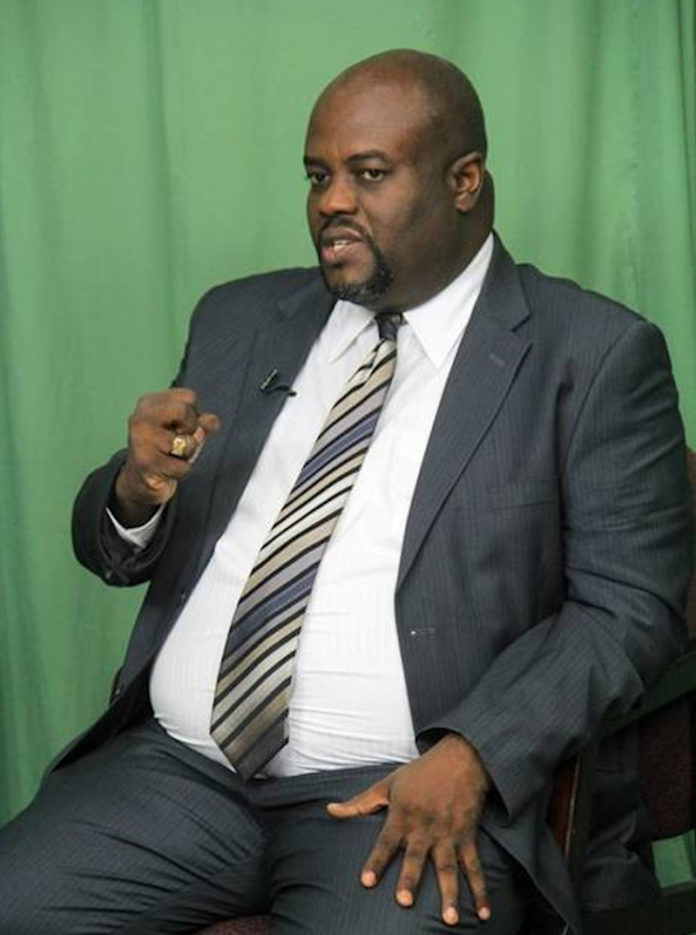
(Français)
Last week, we saw how Rudy Hériveaux and a group of “moderates,” including Gérard Gilles and Jonas Coffy, tried to take over the Lavalas Family party but failed due to the resistance of more militant grassroots popular organizations.
Three things about Rudy Hériveaux emerge from reviewing what U.S. State Department officials write about him: 1) he supported the policies of President René Préval; 2) he wanted to limit the demands and protests of the grassroots popular organizations affiliated with the Lavalas Family party (FL), and 3) he appealed to the U.S. Embassy to act as the FL’s lawyer in its dealings with Préval.
On Jan. 25, 2008, then Sen. Rudy Hériveaux had breakfast with U.S. Ambassador Janet Sanderson at her residence. During the meeting, Hériveaux “told the Ambassador he supports President Préval” but “lamented, however, that President Préval had not reciprocated this support by appointing Fanmi Lavalas members, if not to cabinet minister posts, at least to Director General positions in one or more ministries,” Sanderson explained in a Feb. 7, 2008 cable.
It is sad enough that “undeniably the most prominent FL representative in the legislature” reveals himself to be little more than a horse-trading politician, angling for government jobs in the most venal tradition of Haiti’s “political class.” The Lavalas movement that emerged after the fall of dictator Jean-Claude Duvalier in 1986 was supposed to stand against corruption, political magouilles (wheeling and dealing), and quid pro quo patronage.
But the Lavalas was above all an anti-imperialist movement, aimed at ending decades of foreign domination of Haitian affairs. Therefore it was particularly outrageous that during the breakfast meeting Hériveaux “suggested the [U.S.] Ambassador might bring this idea up with President Préval,” i.e. that he name some of Hériveaux’s FL partisans to government posts. In short, Hériveaux was blatantly asking Sanderson to meddle in Haiti’s internal political affairs.
Hériveaux also told Sanderson that he would do his best “to keep planned Lavalas anti-government protests within bounds,” according to the cable.
“Asked about announcements by Fanmi Lavalas grass roots organizations that large anti-government demonstrations would occur after Carnival, Hériveaux said he would try to make sure that these remained peaceful and did not slip into radicalism,” Sanderson reported.
Ironically, despite Hériveaux’s service to and groveling before Washington, the embassy viewed him with some disdain. “Senator Hériveaux’s moderation in front of the Ambassador was no doubt in part motivated by the desire to convince the USG [U.S. government] that Fanmi Lavalas is a responsible political actor that deserves inclusion in the government,” Sanderson wrote. She also understood that “Heriveaux’s political moderation is not widely shared by Fanmi Lavalas militants” and that “[o]utside of Port-au-Prince and the West Department, Hériveaux remains a peripheral figure.”
Despite this circumspection, the U.S. approved of the efforts of Hériveaux and his renegades to take over the Lavalas Family party. Hériveaux explained to Sanderson how he and other “Lavalas moderates” duplicitously supported popular mobilizations so as not reveal their true agenda.
“Hériveaux noted to Poloff [the embassy’s political officer] that FL leadership [i.e. Hériveaux’s sector] was strongly against the planned protest scheduled for February 29 by FL grass roots partisans,” Sanderson wrote in a Feb. 26, 2008 cable. “According to Hériveaux, FL leadership was compelled to throw their support behind the grass roots organizers for fear of losing popular support.”
Hériveaux and his clique, “[w]ith the prospect of senate elections looming,” were particularly worried about the contest for the North’s Senate seat between Nahoum Marcellus, who was part of Hériveaux’s current, and Moïse Jean-Charles, who led a radical Lavalas current although he ran under the banner of Préval’s Lespwa political coalition.
Because of this fight in particular, “Heriveaux underscored that FL leadership has to maintain popular support among grass roots members,” Sanderson wrote.
She erroneously concluded that Hériveaux and his branch of the “FL appears to be preaching the right doctrine to politically position itself for dominance.”
However, the “right doctrine” did not work, and the Haitian masses were not duped by the posturing of Hériveaux and his group. Moïse Jean-Charles handily trounced Nahoum Marcellus in the 2009 Senate race. Marcellus, like Hériveaux, went on to become an ally of President Michel Martelly. Sen. Moïse Jean-Charles has become one of the most prominent leaders of the current nationwide uprising denouncing Martelly’s corruption and demanding his resignation.
Although she saw Hériveaux’s clique as “educated and politically savvy,” Sanderson recognized that they had “ideological differences” with FL’s “grass roots partisans” and that this would “remain an impediment to restructuring” the party under Hériveaux’s leadership.
Hériveaux’s Treachery in the 2009 Election Controversy
The U.S. Embassy cables trace how in early 2009, Dr. Maryse Narcisse’s FL Executive Committee briefly entered into an alliance with Hériveaux in an internal FL dispute prior to April 2009 parliamentary elections. Narcisse and Hériveaux proposed one list of candidates while another “moderate” faction, led by former Aristide Prime Minister Yvon Neptune and former Chamber of Deputies President Yves Cristalin, proposed another.
In a Jan. 30, 2009 cable, Sanderson told Washington that the FL Executive Committee’s “relative organizational and popular strength” gave the Narcisse/Hériveaux alliance an “advantage in the dispute” with the Neptune/Cristalin group.
But on Feb. 3, 2009, two days before the official announcement, Haiti’s Provisional Electoral Council (CEP) President Frantz Verret and Director Pierre-Louis Opont told the embassy that the CEP had “decided to exclude all Fanmi Lavalas candidates from the upcoming Senate elections, based on a what Embassy and others believe is a strained reading of the electoral law, and the fact that two FL factions submitted competing candidate lists,” Deputy Chief of Mission Thomas Tighe wrote in a Feb. 4, 2009 cable.
The CEP officials told the U.S. embassy that “since none of the FL candidates’ registration documents bears the authorization of party leader Jean Bertrand Aristide, Haiti’s electoral law dictates their exclusion,” Tighe wrote.
After the ruling, Narcisse “submitted to the CEP on February 9 a mandate purportedly signed by Aristide authorizing her to designate FL candidates for elections, as well as to assume other authorities of the party leader,” Ambassador Sanderson wrote in a Feb. 11, 2009 cable. “The document, dated April 27, 2004 in Jamaica and typed in French, is Narcisse’s response to CEP officials…”
Here is where Hériveaux politically stabbed Narcisse in the back, the cables show. The same day, Hériveaux “told the press February 9 that he was surprised by the existence of this document [i.e. Aristide’s signed letter],” thereby ending his “uneasy alliance with Narcisse since November 2008,” according to Sanderson. Already Hériveaux had “privately signaled [to the U.S. embassy] his willingness to talk with Cristalin” and his “moderate” faction, which claimed Narcisse’s “document is not authentic” but “was created by superimposing the text on a photocopy of Aristide’s signature.”
Cristalin and the “moderates then submitted their own list of candidates to the
CEP that was identical, but for one name,” to Narcisse’s list. This managed “to bring Senator
Rudy Heriveaux and Deputy Sorel Francois over to their camp,” Sanderson explained in a Feb. 17, 2009 cable, but “lacking the Aristide endorsement that the CEP had demanded, the new list was also rejected out of hand.”
The conflict between Narcisse’s faction and the Cristalin/Neptune faction continued for some time after FL’s disqualification in February 2009, but Hériveaux, “who has made overtures to both sides in recent months, remains isolated from both groups,” Sanderson explained in a May 29, 2009 cable which relates a May 4, 2009 meeting which the U.S. Embassy’s political counselor held with Dr. Narcisse. “While Narcisse seemed to hold open the possibility of compromise with FL moderates such as Neptune and Cristalin, she dismissed Senator Rudy Heriveaux as in no way authorized to speak for or lead FL. Narcisse claimed that the electoral authority had offered to accept the Lavalas Senate slate if Narcisse and Heriveaux jointly endorsed the party list, but she had refused to sign, because to do so would have implied recognition of Heriveaux as a Lavalas representative.”
Hériveaux’s and his “moderates” were never successful in taking over the the FL during Aristide’s exile in South Africa, but ironically, since Aristide’s return to Haiti on Mar. 18, 2011, at least one of them has managed to find a key role in the party.
Former Sen. Louis Gérard Gilles, who was one of Hériveaux’s closest allies, now sits on the Executive Committee of the Lavalas Family under the leadership of Dr. Maryse Narcisse with Aristide’s benediction. Nevertheless, Gilles is distrusted by the Lavalas base for today advocating negotiations with President Martelly, who is barely clinging to power in the face of almost daily demonstrations demanding his resignation.
Former Deputy Jonas Coffy, another Hériveaux collaborator, became the leader of the Haitians for Haiti, founded by former prime minister Yvon Neptune. Phélito Doran, another Haitians for Haiti leader, is Martelly’s Minister for Liaison with the Parliament. Nonetheless, in October 2014, Coffy’s party joined the launching of the Platform of Dessalines Children (PPD), which has been calling for Martelly’s resignation. Eventually, the contradictory positions of Haitians for Haiti caught up to Coffy when he, like Gilles, advocated negotiations with Martelly, and the PPD expelled him.
Nonetheless, Hériveaux, as Martelly’s Communications Minister, remains the most reviled of the “Lavalas moderates.” Today, he is the butt of popular jokes and scorn for calling anti-government protestors “cockroaches.” The secret U.S. diplomatic cables, given by WikiLeaks to Haïti Liberté, paint the portrait of a consummate opportunist, who, as Ambassador Sanderson observed in a Nov. 10, 2009 cable, never enjoyed as a political leader either “formal authority or grassroots support.”











Hi,
Are you still in business?
I found a few errors on your site.
Would you like me to send over a screenshot of those errors?
Regards
Jacob
(714) 500-7363